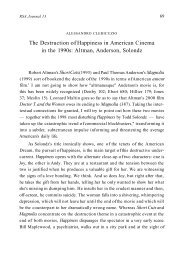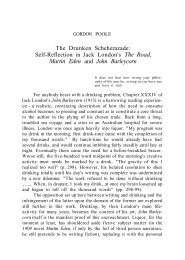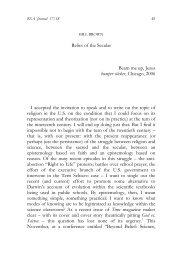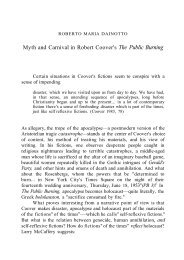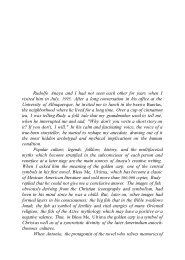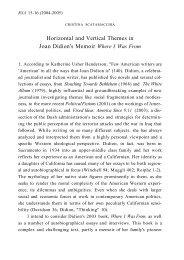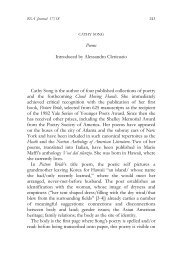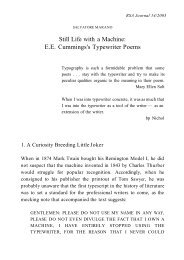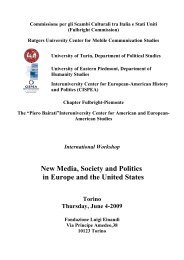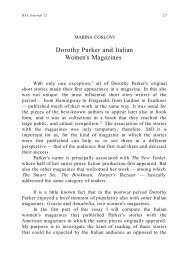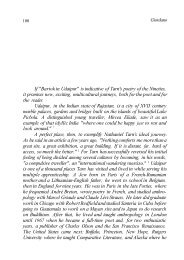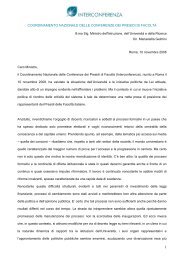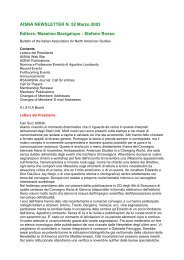An American Jeremiah in Rome: A Study of Margaret Fuller's ... - aisna
An American Jeremiah in Rome: A Study of Margaret Fuller's ... - aisna
An American Jeremiah in Rome: A Study of Margaret Fuller's ... - aisna
- No tags were found...
You also want an ePaper? Increase the reach of your titles
YUMPU automatically turns print PDFs into web optimized ePapers that Google loves.
116 RSA Journal 11<br />
nationalist ideology: the former by <strong>in</strong>vit<strong>in</strong>g America to rega<strong>in</strong> its<br />
position <strong>of</strong> republican paragon, and the latter by imply<strong>in</strong>g that<br />
America's preem<strong>in</strong>ence was never challenged by the Italians'<br />
performance <strong>in</strong> the first place.<br />
Aestheticiz<strong>in</strong>g the Revolution<br />
Despite its accuracy, the dichotomy I have del<strong>in</strong>eated above<br />
between a sympathetic public history <strong>of</strong> the Roman republic and a<br />
more critical private one would be reductive and oversimplify<strong>in</strong>g<br />
without the additional exploration <strong>of</strong> how <strong>Fuller's</strong> public dispatches<br />
are themselves a conflicted, contradictory text, <strong>of</strong>ten characterized<br />
by less-than-celebratory approaches to Italian liberalism. Specifically,<br />
the Tribune articles repeatedly present the Italian revolutions not as<br />
historical events fraught with political significance, but as spectacles<br />
enacted for the enterta<strong>in</strong>ment <strong>of</strong> the <strong>American</strong> observer and her<br />
transatlantic readers. This aestheticization <strong>of</strong> Italian republicanism is<br />
<strong>of</strong>ten accompanied by a seem<strong>in</strong>gly antithetical lament over Italy's<br />
loss <strong>of</strong> aesthetic value <strong>in</strong> the process <strong>of</strong> political modernization.<br />
Whether the revolution <strong>in</strong> <strong>Rome</strong> is seen as a charm<strong>in</strong>g pageant or,<br />
on the contrary, as a threat to the touristic pleasures <strong>of</strong>fered by<br />
papal <strong>Rome</strong>, however, both views imply <strong>Fuller's</strong> failure to put<br />
Italian republicanism on a par with <strong>American</strong> democracy.<br />
Upon her arrival <strong>in</strong> <strong>Rome</strong> <strong>in</strong> the spr<strong>in</strong>g <strong>of</strong> 1847, Fuller wrote<br />
to her socialist friend William Henry Chann<strong>in</strong>g that "art is not<br />
important to me now." Instead, she cont<strong>in</strong>ued, "I take <strong>in</strong>terest <strong>in</strong><br />
the state <strong>of</strong> the people, their manners, the state <strong>of</strong> the race <strong>in</strong> them.<br />
I see the future dawn<strong>in</strong>g; it is <strong>in</strong> important aspects Fourier's<br />
future". 41 It was an unconventional declaration, s<strong>in</strong>ce <strong>in</strong> the<br />
<strong>American</strong> imag<strong>in</strong>ation Italy had traditionally embodied artistic<br />
rather than political achievements, and represented temporal<br />
stagnation rather than historical evolution. 42 Fuller did write about<br />
Italy's revolutions <strong>in</strong>stead <strong>of</strong> its monuments at a time when other<br />
major New England <strong>in</strong>tellectuals like Emerson and Hawthorne<br />
largely ignored them. Still, her representation <strong>of</strong> the people <strong>in</strong> the<br />
act <strong>of</strong> mak<strong>in</strong>g history <strong>of</strong>ten reduces them once more to apolitical



